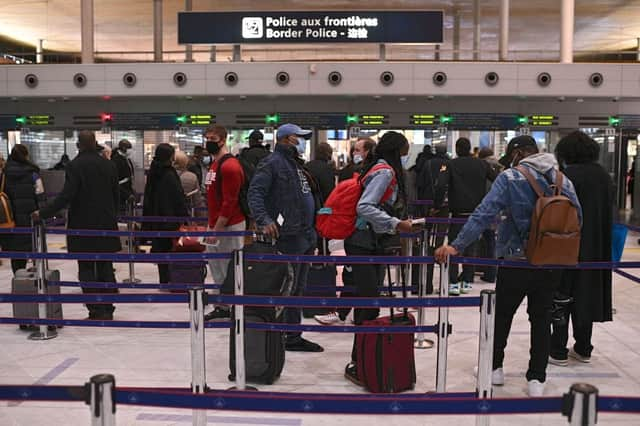Travellers need ‘compelling reason’ to enter France from UK as border restrictions tighten


Travellers from the UK will need to provide “compelling reasons” to enter France from Monday (31 May) as the country tightens its border controls.
French authorities are tightening restrictions in a bid to prevent the spread of the Indian coronavirus variant, which is currently circulating in parts of the UK.
Essential travel only
Advertisement
Hide AdAdvertisement
Hide AdTravel to France from the UK will only be permitted for EU nationals, French residents, or those travelling for essential reasons.
Those who are allowed to enter must take a pre-departure PCR or antigen Covid-19 test within 48 hours of travel and quarantine for seven days on arrival.
Travellers entering France from outside the European Union, including the UK, also have to sign a sworn declaration that they do not have coronavirus symptoms and are not aware of being in contact with someone with the disease in the 14 days before their journey.
People aged 11 and over must also make a sworn declaration to self-isolate on arrival in France for seven days, and take a second PCR test after the quarantine period.
Advertisement
Hide AdAdvertisement
Hide AdThe UK’s Foreign, Commonwealth and Development Office (FCDO) said the new French travel rules apply to all air, car, ferry and train passengers.
The stricter rules for UK visitors were raised by French foreign minister Jean-Yves Le Drian last week amid growing concerns over the Indian variant.
The new rules on the website of the Consulate General of France in London state: “Given the development of the so-called Indian variant, health measures have been tightened for people travelling to France from the UK.”
It added that from Monday (31 May) morning “compelling reasons will be required for foreign nationals outside the EU not resident in France to travel to France from the UK”.
Advertisement
Hide AdAdvertisement
Hide AdHowever, due to the “low incidence of Covid in the UK”, travellers who enter France from the UK will not be subject to systematic checks where they are staying “for the moment”.
The consulate website says that people who have been vaccinated against Covid-19 remain subject to the same rules, and people are “strongly advised” to keep international travel “to a minimum”.
The tougher rules from France follows Germany starting to require people arriving from the UK to go into quarantine for 14 days, which again comes in response to the spread of the Indian variant.
Loading....
An amber list destination
France is currently listed as an “amber” destination on the UK’s travel traffic light system, meaning people travellers will have to self-isolate for 10 days on arrival back in the UK, and take two Covid-19 tests.
Advertisement
Hide AdAdvertisement
Hide AdWhile travel to amber listed countries is not illegal, government advice recommends against travel to both amber and red listed countries for leisure purposes, with holidaymakers instead urged to only visit destinations on the green list.
Prime Minister Boris Johnson has stressed that countries on the amber list are “not somewhere where you should be going on holiday”, with these destinations requiring stricter quarantine measures on their return.
If you do choose to travel to an amber destination for your holiday, you will be going against government advice and additional Covid checks will be required.
As the Foreign, Commonwealth and Development Office is currently advising against travel to amber listed countries, which include popular holiday destinations such as Spain, Greece, France and Italy, it is likely that travellers will not be able to get adequate insurance to cover their trip.
Advertisement
Hide AdAdvertisement
Hide AdHannah Isitt, Travel insurance expert at GoCompare, told NationalWorld: “There is no travel insurance product that covers against the traffic light system, only a change in the FCDO advice.
"The traffic light system does not impact the insured travel policy – the coverage is dependent on the FCDO advice. One example at the moment is Israel – which is on the green list - but no cover as FCDO advises against all travel, whereas Rhodes, which is amber, is covered as FCDO isn’t advising against travel.
“If the policy holder is on their trip when there is a change in traffic light, from green to amber, and if the insured person stays on the trip they will continue to get the same cover as when they travelled.
"Insurers will not cover the costs for testing, unless it’s part of a medical claim, or quarantine costs.”